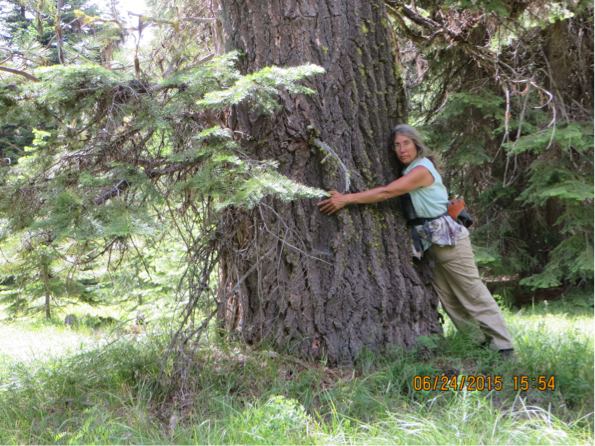sent to Earth First! Newswire / by Blue Mountains Biodiversity Project

A Ninth Circuit Court panel has granted Blue Mountains Biodiversity Project’s motion for a stay, leaving in place the injunction that prevents the Forest Service from logging the mature and old forest around Walton Lake in the Ochoco National Forest.
Walton Lake is located in the Ochoco Mountains in central Oregon, northeast of Prineville. The Lake is one of the most popular recreation areas on the Ochoco National Forest, and is known for its old growth trees, abundant wildlife, and scenic beauty.
Blue Mountains Biodiversity Project (BMBP), represented by Tom Buchele at Earthrise Law Center, and Jesse Buss and Bridgett Chevallier at Willamette Law Group, have been fighting to stop logging of the forest around Walton Lake since 2015. The Forest Service has repeatedly attempted to log this magnificent and ecologically important forest in three separate but virtually identical proposals over the past several years. BMBP and its dedicated attorneys successfully stopped the agency’s first two logging proposals, and are now appealing to the Ninth Circuit Court to stop the agency’s third and most recent attempt.
In September of 2021, BMBP was granted a Preliminary Injunction to halt planned logging around the Lake, pending the District Court’s decision. In September of 2022, the District Court decided against most of BMBP’s claims. The District Court’s ruling would have paved the way for the Forest Service to begin logging as early as this fall. Fortunately, on November 18th, 2022, a Ninth Circuit panel stepped in and agreed to leave the injunction against logging in place—and to keep the trees around Walton Lake standing—while BMBP’s appeal of the lower court’s decision is being considered.
The Walton Lake sale authorizes clearcutting of all the fir trees, including very large and old firs, on approximately 35 acres. The sale also includes an additional 43 acres of logging in mature and old forests that form the scenic backdrop of the lake and provide important habitat for wildlife. BMBP’s initial lawsuit showed that although the Forest Service’s notices to the public described their proposed logging as “thinning,” an internal Forest Service document described the logging of the old growth fir forest as a “clearcut”.
The Forest Service is attempting to use public safety as a guise for old growth logging. The agency claims that logging is needed to eliminate root rot that is supposedly creating a public safety problem, even though many of the targeted firs are not currently infected and are nowhere near the Walton Lake campsites or roads. The agency is planning to essentially clearcut the old growth and predominately fir forest around the lake because some of the firs have laminated root rot, as they have for decades. Such heavy logging is unnecessary since the Forest Service has the ongoing ability to fell legitimate roadside and campground hazard trees, and has been using this method to protect public safety for years. BMBP has no objection to legitimate hazard tree felling. BMBP’s legal challenges do not impede the Forest Service’s ability to conduct legitimate hazard tree felling.
This appeal could set multiple important legal precedents across the Ninth Circuit (a huge area encompassing most of the western United States); it has the potential to resolve long-standing legal questions about the types of documents courts are allowed to consider in environmental cases like this one, whether the Forest Service must focus on evaluating local environmental impacts for relatively small-acreage timber sales, and whether the Forest Service is allowed to award logging contracts to companies before completing the environmental review process under NEPA.
For example, the Forest Service has maintained an open contract for logging in the Walton Lake sale since 2016, despite formally withdrawing the proposal twice in recent years. “It certainly doesn’t help the Forest Service’s case that they failed to cancel the active timber sale contract they awarded years ago,” says Karen Coulter, Director of Blue Mountains Biodiversity Project. “The Environmental Assessment could not be unbiased, given that the Forest Service was keeping an active, already awarded timber sale contract in effect. We hope that the Forest Service will finally abandon this misguided timber sale.”
“The regulations say that the Forest Service isn’t allowed to take any pre-decisional action that ‘prejudices’ or ‘limits’ the range of alternatives considered in the environmental analysis,” says Attorney Jesse Buss of Willamette Law Group. “In other words, the Forest Service is required to keep all its options open until it makes a final, informed decision. But here, four years before making a decision, the Forest Service awarded a logging contract that is entirely financially dependent on clear-cutting the large, old firs at Walton Lake. Without that logging contract, the Forest Service can’t afford to implement the project. How does that keep the Forest Service’s options open?”
“The Forest Service’s responses to the public safety issues like those at Walton Lake are far too often over-reactions that end up favoring the logging of old and large commercially valuable trees. Here the Forest Service’s own experts recommended a much less extreme response, but the actual Forest Service decision-makers decided to stick with their premature contract and log far more old and large trees to generate more revenue,” says Tom Buchele, a clinical professor with the Earthrise Law Center.
Blue Mountains Biodiversity Project is a grassroots ecological protection group based in Eastern Oregon that monitors and challenges agency actions in order to protect public lands on the Blue Mountains and the Eastern Oregon Cascades.
Earthrise Law Center is the domestic environmental law clinic at Lewis & Clark Law School that provides legal training for future public interest lawyers and pro bono legal representation for not-for-profit environmental protection groups like the Blue Mountains Biodiversity Project.
Based in Oregon City, the Willamette Law Group represents people defending the natural world and public spaces, including protecting ancient old-growth forests from clear-cut logging, keeping public lands public, supporting biodiversity, and opposing irresponsible development.
